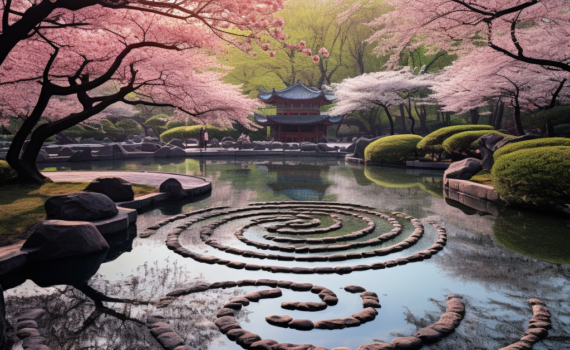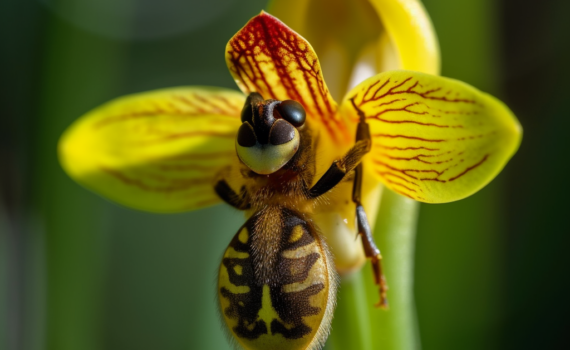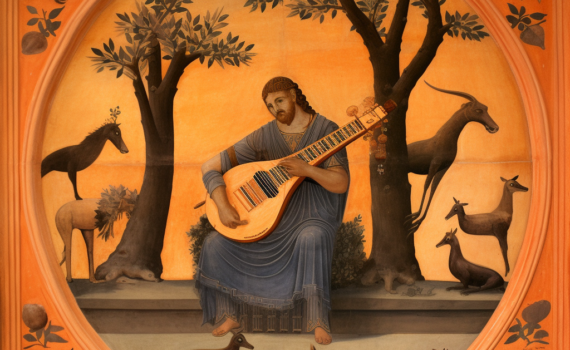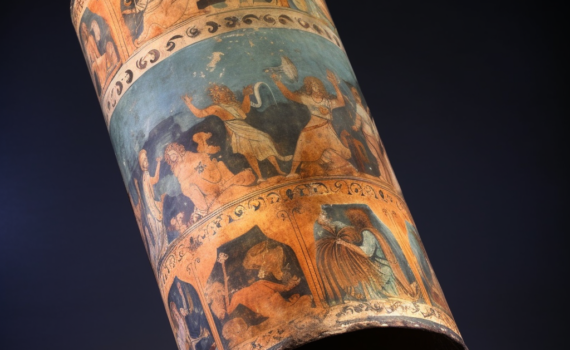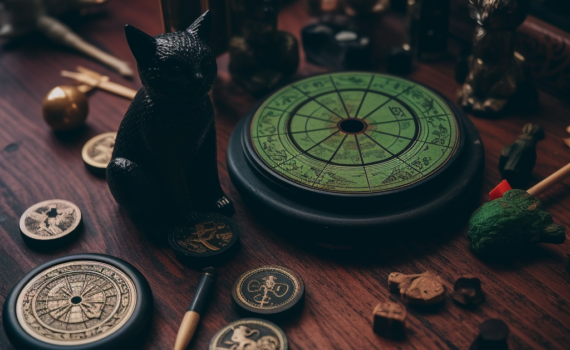Dearest readers, Today, I invite you to embark upon a meandering journey through the tranquil pathways of Taoism, an ancient philosophy originating from the mystic lands of China. The tapestry of Taoism is interwoven with wisdom, spirituality, and a yearning to dwell harmoniously within the ebbs and flows of the universe. The word ‘Tao’ (pronounced Dao) can be roughly translated to mean ‘the way’ or ‘the path,’ and in Taoism, it signifies the underlying essence of all that is. The foundational text of Taoism is the Tao Te Ching, attributed to the enigmatic sage Laozi, believed to have lived in the 6th century BCE. The text, composed of a mere 81 short chapters, is akin to a beguiling stream of wisdom that babbles with paradoxes and poetic imagery. The Tao Te Ching’s pages exude an insurmountable depth, enticing the soul to dive into its tranquil waters. One of the most […]
Percival Q. Higginbottom
There’s a rather popular saying that goes, “Comedy is tragedy plus time.” In a way, it encapsulates the inherent dichotomy of humor, the way it can convert life’s most awkward, painful, or bizarre moments into a source of amusement. It’s a fascinating realm to delve into, a labyrinth of laughter and amusement, filled with the echoes of shared human experiences. The greatest comedians are, in essence, artists, wielding a paintbrush dipped in hues of humor and wit. But instead of creating static images on a canvas, they sketch vibrant vignettes of life, capturing our follies, hopes, and ironies, in ways that allow us to laugh at our collective vulnerabilities. They are masters of observation, unmasking the ordinary, the overlooked, and the underappreciated to reveal their comic potential. Consider the realm of stand-up comedy, where the comedian stands alone on stage, armed only with their wits and a microphone. Their job […]
Greetings, dear reader, Laughter, they say, is the best medicine. Yet, have we ever stopped to wonder about this ubiquitous part of our lives? Have we contemplated the hows and whys of our giggles, our chuckles, and our uproarious bouts of belly laughter? Today, I invite you to join me on a voyage of discovery into this fascinating facet of human behavior, as we attempt to decode the psychology of laughter. Humans are social creatures. We thrive on connection, communication, and mutual understanding. Laughter acts as a potent, yet often overlooked, glue in this social fabric. In fact, researchers have found that we are 30 times more likely to laugh in social settings than when we are alone. This suggests a profound role for laughter in our social interactions, a role that transcends mere expression of humor. From an evolutionary standpoint, laughter may have been a mechanism for signaling safety […]
Greetings, dear reader, I invite you today to embark on a journey through a psychological landscape that, for many of us, is achingly familiar – the realm of procrastination. Ah, the art of procrastination! That fiendish habit of deferring tasks we deem unpleasant, arduous, or overwhelming. Is there a soul among us who has not, at one time or another, fallen prey to its tantalizing lure? Today, let us attempt to unravel this enigma. Procrastination is a curious phenomenon indeed. Why is it that we often choose to delay tasks, even when we know full well that this deferral might result in additional stress, rushed work, or missed deadlines? Are we inherently self-sabotaging, or is there a more profound reason behind this puzzling behavior? Let us delve into the realm of behavioral psychology for some answers. Here, we encounter the concept of ‘time inconsistency’ – the idea that we value […]
Greetings, kindred spirits! Today, we set sail on an odyssey through time to the cradle of Western civilization – Ancient Greece. Its ruins, scattered across the Mediterranean, are portals into an era of profound wisdom, valorous heroes, and divine gods. So, lace up your sandals and grab your sun hats as we embark on this fascinating journey. Our first stop is the indomitable Acropolis of Athens. Its grandeur, poised atop a rocky outcrop, continues to dominate the Athenian skyline, silently narrating tales of heroic deeds and divine interventions. The Parthenon, its centerpiece, stands as a magnificent testament to the pinnacle of Doric architecture and the spirit of Athenian democracy. Further south lies the Sanctuary of Apollo at Delphi, once considered the navel of the world. Here, Pythia, the oracle, spoke prophecies in cryptic verses that influenced decisions of state and personal affairs alike. The site’s mystical allure draws one into […]
As the world begins to stabilize after the unanticipated chaos of the pandemic, it is becoming increasingly clear that life as we know it, particularly our work lives, will never be the same. The upheaval caused by the virus has dramatically transformed our conception of work, bringing with it a raft of significant shifts that will likely shape our society for years to come. Before the pandemic, the conventional wisdom dictated a rigid, 9-to-5, office-centric structure for work. Commuting was an accepted part of daily life, and the separation between work and home was distinct. However, the pandemic’s compulsory adoption of remote work blurred those lines, pushing us to reconsider our long-held notions of work-life balance and productivity. It wasn’t a smooth transition for everyone, of course. The switch to remote work came with its own challenges—technical hitches, communication barriers, and even feelings of isolation. But amidst the chaos, many […]
Orchids. They are a dazzling testament to nature’s creativity, found in every color, shape, and size imaginable. Some are extravagantly beautiful, while others are curiously strange. But beyond their visual allure, some of these flowers have evolved an extraordinary survival technique that seems almost deceitful. Today, dear readers, we delve into the realm of orchid mimicry. It is a tale that begins with the simple act of pollination. Flowers, to ensure their survival, need to transfer their pollen to other plants. Most achieve this feat with the assistance of unsuspecting pollinators – bees, butterflies, birds, and even bats. They entice these creatures with a promise of nectar, who then, in their quest, inadvertently pick up pollen and carry it to the next flower. However, some orchids have decided to take a different path. Rather than offering a reward, they have evolved to exploit the sensory biases of their pollinators. Orchids […]
Greetings to you, dear reader! When we speak of music and emotions, our minds often leap to modern compositions, with lyrics that grip our hearts or melodies that make our spirits soar. Yet, music’s potent influence on the human psyche reaches much further back, into the realm of ancient myths and tales. Today, let’s set our time machine to a period marked by gods, demigods, and epic heroes – Ancient Greece. The power of music in Greek mythology is not just an abstract concept but an active participant in the stories. Often, it becomes the device that shifts the narrative’s course, showcasing its ability to enchant, pacify, or provoke. In the enthralling world of Greek mythology, music is both a divine endowment and a mortal’s tool. Consider the Muses, nine goddesses who were patrons of the arts, especially music and poetry. They were considered the source of the knowledge embodied […]
Greetings, dear readers! In today’s blog, we’ll dive headfirst into one of the most thrilling, perplexing, and enlightening domains of science: quantum physics. Specifically, we’ll explore the revolutionary Double-Slit Experiment—an experiment that I assure you, despite its seemingly simple setup, has upended our understanding of the physical world. But first, a gentle warning. Quantum physics, as Werner Heisenberg, one of the founding fathers of this theory, once said, “is a realm where our everyday logic collapses”. So, buckle up for a fascinating, albeit strange, journey. Our tale begins in the 19th century, when light was largely understood as a wave phenomenon. Then, a man named Thomas Young, in a simple but ingenious experiment involving light, two slits on a barrier, and a screen, presented us with an interesting quandary. Young shone light—imagine it as a wave of crests and troughs—on a barrier with two slits. Logically, one might expect to […]
When we gaze into the pantheon of literature, it becomes evident that the gods of myth never truly die. Their stories echo across the ages, dressed in new garments, yet bearing familiar faces. Their triumphs, follies, and profound archetypes continue to resurface in modern narratives, giving us a broader lens to understand our own lives and the world around us. In this blog post, I want to explore the lure of legends and the enduring power of myth in contemporary literature. From Tolkien’s Middle-earth to J.K. Rowling’s wizarding world, authors have consistently turned to ancient mythologies to fuel their imaginative landscapes. Mythology serves as an inexhaustible wellspring of inspiration for authors. These narratives provide a shared cultural framework that resonates with readers, even as the stories evolve and morph to reflect contemporary concerns. To write new stories with ancient souls, many authors have turned to myth as their guide. Take, […]
Dear readers, today, I invite you to join me on an intriguing journey, exploring an element of music that often goes unnoticed, yet remains central to the experience: silence. When we think of music, it is the notes, the melody, the rhythm that usually take center stage. But what about the silent interludes, the pauses, the breaks? Are they merely empty spaces, or do they hold a deeper significance? In music, silence is far from being an absence. It’s a powerful presence, an active participant that shapes the narrative of the composition. Pauses, in their seemingly contradictory role, serve to bring the notes, melodies, and harmonies to life. They provide room for the sound to breathe, the listener to reflect, and the music to resonate. The power of a well-placed pause is universal, reaching across various genres and styles. In classical music, composers like Ludwig van Beethoven were masters at […]
Greetings, dear readers! Today, let’s venture into the enigmatic terrain of human psychology to explore a ubiquitous yet puzzling phenomenon – superstition. Whether it’s avoiding the path of a black cat, knocking on wood to prevent jinxing good fortune, or carrying a lucky charm for a crucial meeting, we’ve all come across such intriguing practices. But have you ever wondered why superstitions hold such a sway over us, despite living in an age of scientific advancement and rational thought? Superstition, in essence, is a belief in supernatural causality. We link an action or event to an unrelated outcome based on the belief in luck, fate, magic, or spiritual beings. These connections often lack scientific backing, yet they persist and thrive across cultures and societies worldwide. Why do we humans, rational beings that we are, give into such irrational practices? The roots of this behaviour extend into our deep-seated psychological wiring. […]
